NB520 Maritime Law Assignment: Autonomous Ships and Freight Forwarders
VerifiedAdded on 2022/11/28
|11
|3717
|440
Homework Assignment
AI Summary
This assignment solution addresses key topics in maritime law, including the legal basis of autonomous ships under UNCLOS, the role of salvage arbitrators in determining awards, and the circumstances under which freight forwarders act as agents or principals. The solution analyzes the application of maritime law principles to specific scenarios, such as a salvage operation involving a grounded vessel and the services of a tug. The assignment explores the responsibilities and liabilities of various parties involved in maritime activities, including ship owners, salvors, and freight forwarders. It also examines the implications of technological advancements, such as autonomous ships, on existing legal frameworks and international conventions. The solution provides a comprehensive overview of the subject matter and offers practical insights into the complexities of maritime law.
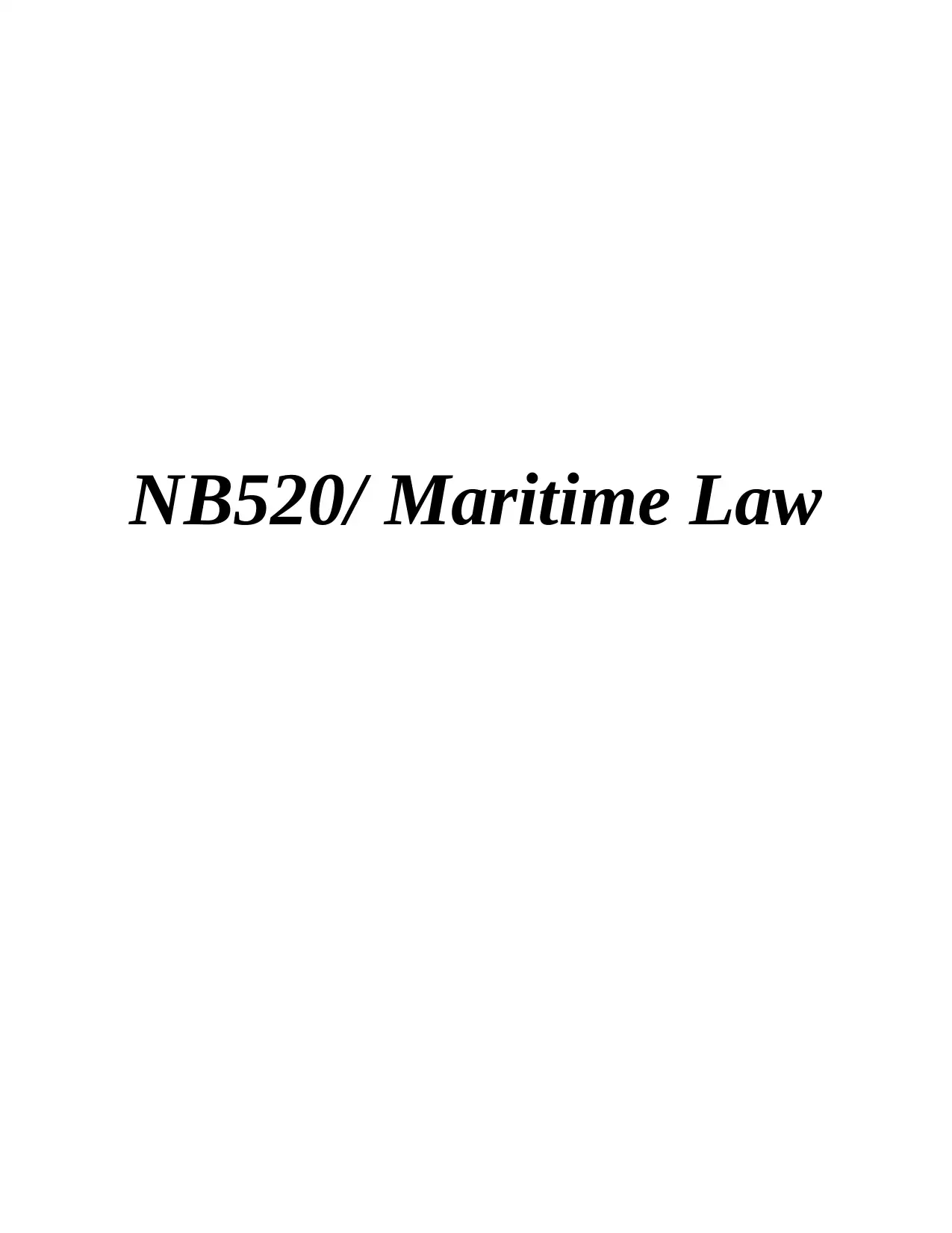
NB520/ Maritime Law
Paraphrase This Document
Need a fresh take? Get an instant paraphrase of this document with our AI Paraphraser
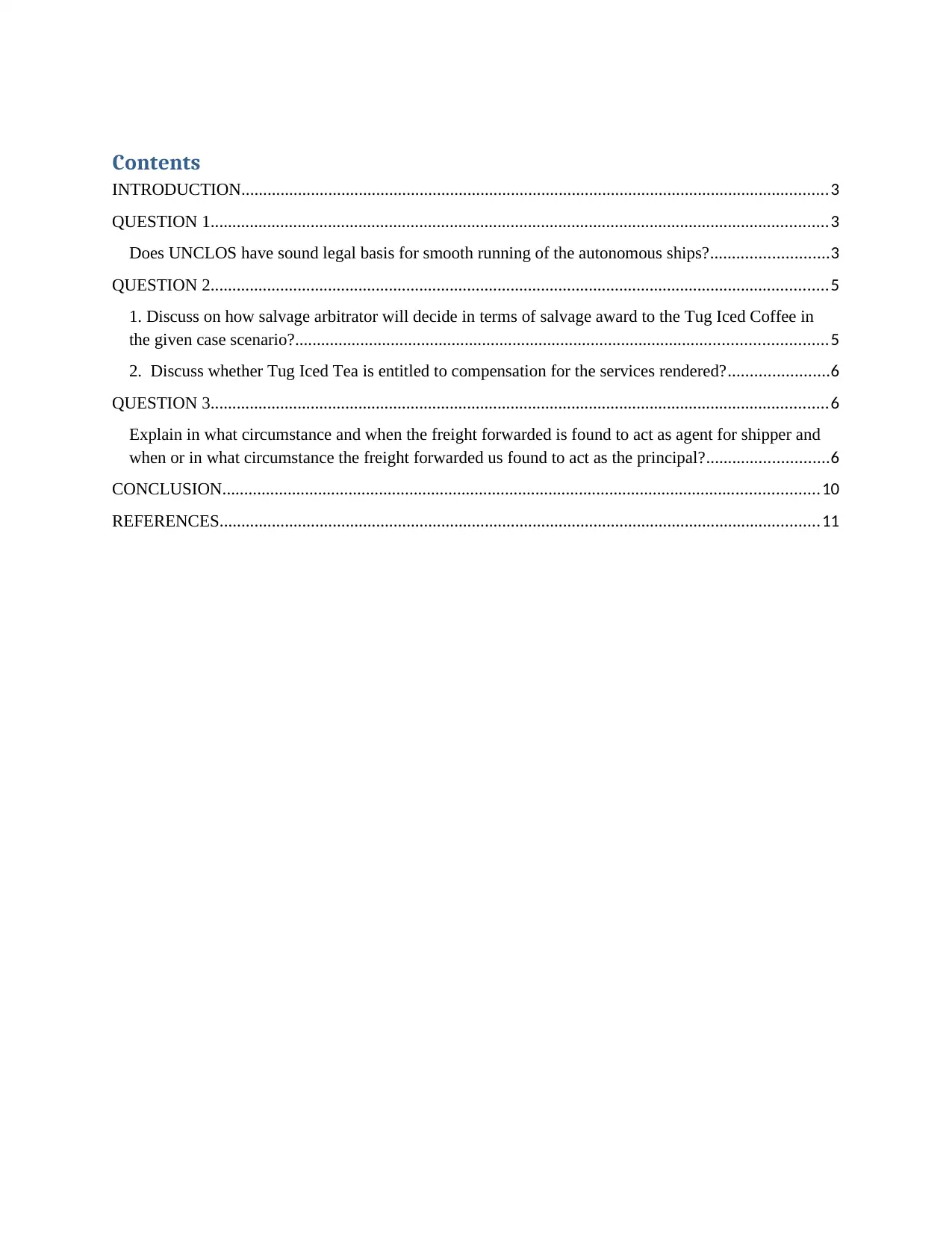
Contents
INTRODUCTION.......................................................................................................................................3
QUESTION 1..............................................................................................................................................3
Does UNCLOS have sound legal basis for smooth running of the autonomous ships?...........................3
QUESTION 2..............................................................................................................................................5
1. Discuss on how salvage arbitrator will decide in terms of salvage award to the Tug Iced Coffee in
the given case scenario?..........................................................................................................................5
2. Discuss whether Tug Iced Tea is entitled to compensation for the services rendered?.......................6
QUESTION 3..............................................................................................................................................6
Explain in what circumstance and when the freight forwarded is found to act as agent for shipper and
when or in what circumstance the freight forwarded us found to act as the principal?............................6
CONCLUSION.........................................................................................................................................10
REFERENCES..........................................................................................................................................11
INTRODUCTION.......................................................................................................................................3
QUESTION 1..............................................................................................................................................3
Does UNCLOS have sound legal basis for smooth running of the autonomous ships?...........................3
QUESTION 2..............................................................................................................................................5
1. Discuss on how salvage arbitrator will decide in terms of salvage award to the Tug Iced Coffee in
the given case scenario?..........................................................................................................................5
2. Discuss whether Tug Iced Tea is entitled to compensation for the services rendered?.......................6
QUESTION 3..............................................................................................................................................6
Explain in what circumstance and when the freight forwarded is found to act as agent for shipper and
when or in what circumstance the freight forwarded us found to act as the principal?............................6
CONCLUSION.........................................................................................................................................10
REFERENCES..........................................................................................................................................11
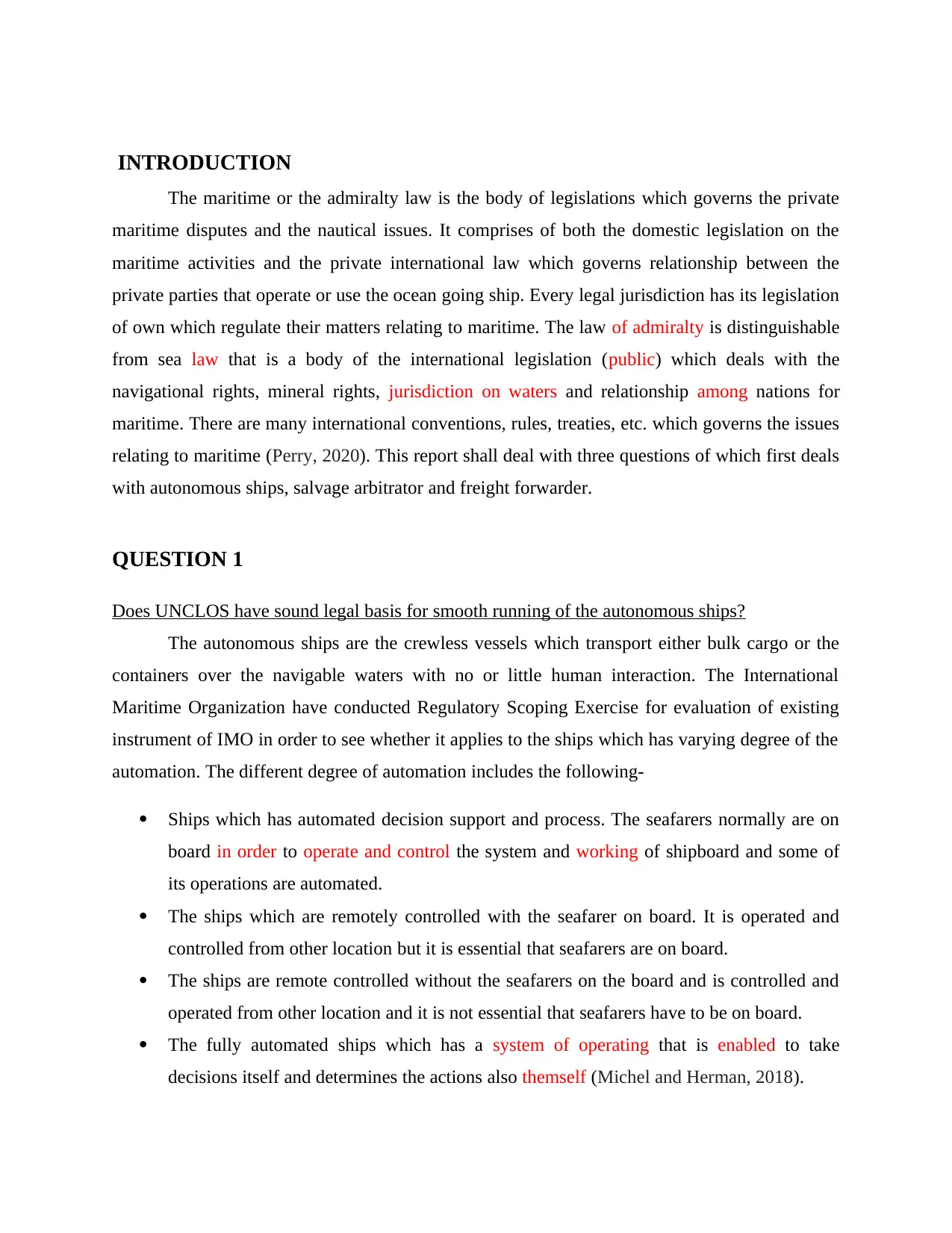
INTRODUCTION
The maritime or the admiralty law is the body of legislations which governs the private
maritime disputes and the nautical issues. It comprises of both the domestic legislation on the
maritime activities and the private international law which governs relationship between the
private parties that operate or use the ocean going ship. Every legal jurisdiction has its legislation
of own which regulate their matters relating to maritime. The law of admiralty is distinguishable
from sea law that is a body of the international legislation (public) which deals with the
navigational rights, mineral rights, jurisdiction on waters and relationship among nations for
maritime. There are many international conventions, rules, treaties, etc. which governs the issues
relating to maritime (Perry, 2020). This report shall deal with three questions of which first deals
with autonomous ships, salvage arbitrator and freight forwarder.
QUESTION 1
Does UNCLOS have sound legal basis for smooth running of the autonomous ships?
The autonomous ships are the crewless vessels which transport either bulk cargo or the
containers over the navigable waters with no or little human interaction. The International
Maritime Organization have conducted Regulatory Scoping Exercise for evaluation of existing
instrument of IMO in order to see whether it applies to the ships which has varying degree of the
automation. The different degree of automation includes the following-
Ships which has automated decision support and process. The seafarers normally are on
board in order to operate and control the system and working of shipboard and some of
its operations are automated.
The ships which are remotely controlled with the seafarer on board. It is operated and
controlled from other location but it is essential that seafarers are on board.
The ships are remote controlled without the seafarers on the board and is controlled and
operated from other location and it is not essential that seafarers have to be on board.
The fully automated ships which has a system of operating that is enabled to take
decisions itself and determines the actions also themself (Michel and Herman, 2018).
The maritime or the admiralty law is the body of legislations which governs the private
maritime disputes and the nautical issues. It comprises of both the domestic legislation on the
maritime activities and the private international law which governs relationship between the
private parties that operate or use the ocean going ship. Every legal jurisdiction has its legislation
of own which regulate their matters relating to maritime. The law of admiralty is distinguishable
from sea law that is a body of the international legislation (public) which deals with the
navigational rights, mineral rights, jurisdiction on waters and relationship among nations for
maritime. There are many international conventions, rules, treaties, etc. which governs the issues
relating to maritime (Perry, 2020). This report shall deal with three questions of which first deals
with autonomous ships, salvage arbitrator and freight forwarder.
QUESTION 1
Does UNCLOS have sound legal basis for smooth running of the autonomous ships?
The autonomous ships are the crewless vessels which transport either bulk cargo or the
containers over the navigable waters with no or little human interaction. The International
Maritime Organization have conducted Regulatory Scoping Exercise for evaluation of existing
instrument of IMO in order to see whether it applies to the ships which has varying degree of the
automation. The different degree of automation includes the following-
Ships which has automated decision support and process. The seafarers normally are on
board in order to operate and control the system and working of shipboard and some of
its operations are automated.
The ships which are remotely controlled with the seafarer on board. It is operated and
controlled from other location but it is essential that seafarers are on board.
The ships are remote controlled without the seafarers on the board and is controlled and
operated from other location and it is not essential that seafarers have to be on board.
The fully automated ships which has a system of operating that is enabled to take
decisions itself and determines the actions also themself (Michel and Herman, 2018).
⊘ This is a preview!⊘
Do you want full access?
Subscribe today to unlock all pages.

Trusted by 1+ million students worldwide
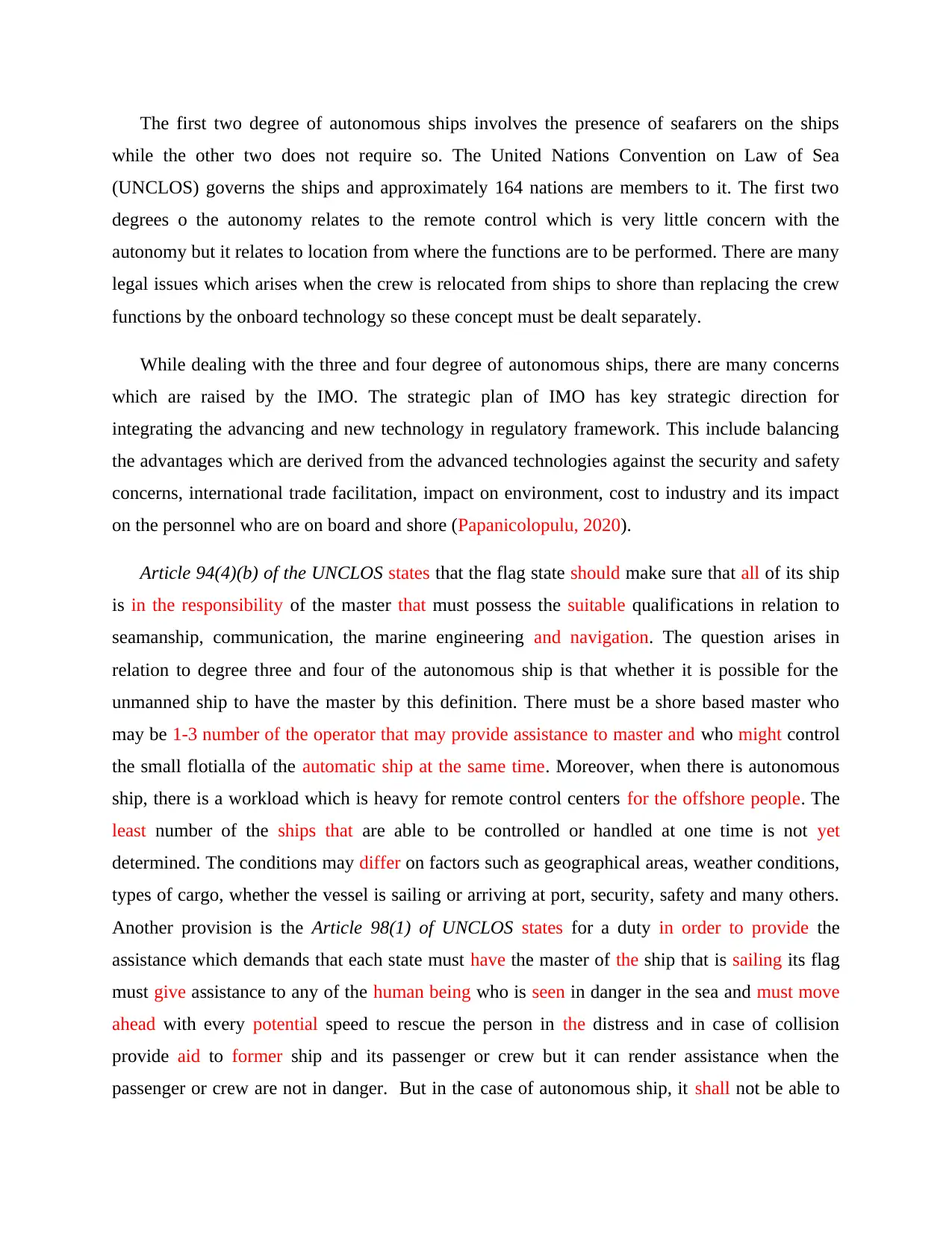
The first two degree of autonomous ships involves the presence of seafarers on the ships
while the other two does not require so. The United Nations Convention on Law of Sea
(UNCLOS) governs the ships and approximately 164 nations are members to it. The first two
degrees o the autonomy relates to the remote control which is very little concern with the
autonomy but it relates to location from where the functions are to be performed. There are many
legal issues which arises when the crew is relocated from ships to shore than replacing the crew
functions by the onboard technology so these concept must be dealt separately.
While dealing with the three and four degree of autonomous ships, there are many concerns
which are raised by the IMO. The strategic plan of IMO has key strategic direction for
integrating the advancing and new technology in regulatory framework. This include balancing
the advantages which are derived from the advanced technologies against the security and safety
concerns, international trade facilitation, impact on environment, cost to industry and its impact
on the personnel who are on board and shore (Papanicolopulu, 2020).
Article 94(4)(b) of the UNCLOS states that the flag state should make sure that all of its ship
is in the responsibility of the master that must possess the suitable qualifications in relation to
seamanship, communication, the marine engineering and navigation. The question arises in
relation to degree three and four of the autonomous ship is that whether it is possible for the
unmanned ship to have the master by this definition. There must be a shore based master who
may be 1-3 number of the operator that may provide assistance to master and who might control
the small flotialla of the automatic ship at the same time. Moreover, when there is autonomous
ship, there is a workload which is heavy for remote control centers for the offshore people. The
least number of the ships that are able to be controlled or handled at one time is not yet
determined. The conditions may differ on factors such as geographical areas, weather conditions,
types of cargo, whether the vessel is sailing or arriving at port, security, safety and many others.
Another provision is the Article 98(1) of UNCLOS states for a duty in order to provide the
assistance which demands that each state must have the master of the ship that is sailing its flag
must give assistance to any of the human being who is seen in danger in the sea and must move
ahead with every potential speed to rescue the person in the distress and in case of collision
provide aid to former ship and its passenger or crew but it can render assistance when the
passenger or crew are not in danger. But in the case of autonomous ship, it shall not be able to
while the other two does not require so. The United Nations Convention on Law of Sea
(UNCLOS) governs the ships and approximately 164 nations are members to it. The first two
degrees o the autonomy relates to the remote control which is very little concern with the
autonomy but it relates to location from where the functions are to be performed. There are many
legal issues which arises when the crew is relocated from ships to shore than replacing the crew
functions by the onboard technology so these concept must be dealt separately.
While dealing with the three and four degree of autonomous ships, there are many concerns
which are raised by the IMO. The strategic plan of IMO has key strategic direction for
integrating the advancing and new technology in regulatory framework. This include balancing
the advantages which are derived from the advanced technologies against the security and safety
concerns, international trade facilitation, impact on environment, cost to industry and its impact
on the personnel who are on board and shore (Papanicolopulu, 2020).
Article 94(4)(b) of the UNCLOS states that the flag state should make sure that all of its ship
is in the responsibility of the master that must possess the suitable qualifications in relation to
seamanship, communication, the marine engineering and navigation. The question arises in
relation to degree three and four of the autonomous ship is that whether it is possible for the
unmanned ship to have the master by this definition. There must be a shore based master who
may be 1-3 number of the operator that may provide assistance to master and who might control
the small flotialla of the automatic ship at the same time. Moreover, when there is autonomous
ship, there is a workload which is heavy for remote control centers for the offshore people. The
least number of the ships that are able to be controlled or handled at one time is not yet
determined. The conditions may differ on factors such as geographical areas, weather conditions,
types of cargo, whether the vessel is sailing or arriving at port, security, safety and many others.
Another provision is the Article 98(1) of UNCLOS states for a duty in order to provide the
assistance which demands that each state must have the master of the ship that is sailing its flag
must give assistance to any of the human being who is seen in danger in the sea and must move
ahead with every potential speed to rescue the person in the distress and in case of collision
provide aid to former ship and its passenger or crew but it can render assistance when the
passenger or crew are not in danger. But in the case of autonomous ship, it shall not be able to
Paraphrase This Document
Need a fresh take? Get an instant paraphrase of this document with our AI Paraphraser
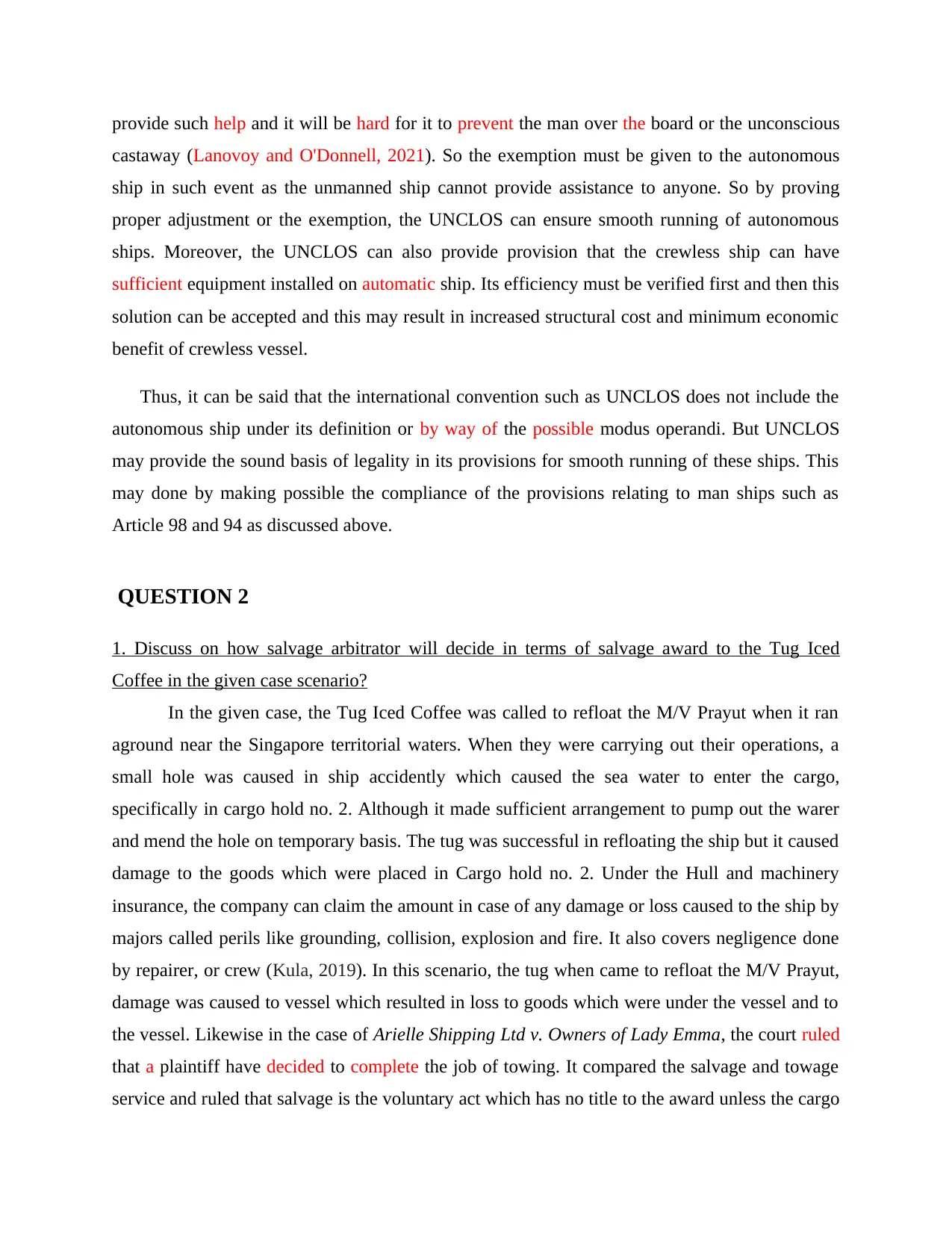
provide such help and it will be hard for it to prevent the man over the board or the unconscious
castaway (Lanovoy and O'Donnell, 2021). So the exemption must be given to the autonomous
ship in such event as the unmanned ship cannot provide assistance to anyone. So by proving
proper adjustment or the exemption, the UNCLOS can ensure smooth running of autonomous
ships. Moreover, the UNCLOS can also provide provision that the crewless ship can have
sufficient equipment installed on automatic ship. Its efficiency must be verified first and then this
solution can be accepted and this may result in increased structural cost and minimum economic
benefit of crewless vessel.
Thus, it can be said that the international convention such as UNCLOS does not include the
autonomous ship under its definition or by way of the possible modus operandi. But UNCLOS
may provide the sound basis of legality in its provisions for smooth running of these ships. This
may done by making possible the compliance of the provisions relating to man ships such as
Article 98 and 94 as discussed above.
QUESTION 2
1. Discuss on how salvage arbitrator will decide in terms of salvage award to the Tug Iced
Coffee in the given case scenario?
In the given case, the Tug Iced Coffee was called to refloat the M/V Prayut when it ran
aground near the Singapore territorial waters. When they were carrying out their operations, a
small hole was caused in ship accidently which caused the sea water to enter the cargo,
specifically in cargo hold no. 2. Although it made sufficient arrangement to pump out the warer
and mend the hole on temporary basis. The tug was successful in refloating the ship but it caused
damage to the goods which were placed in Cargo hold no. 2. Under the Hull and machinery
insurance, the company can claim the amount in case of any damage or loss caused to the ship by
majors called perils like grounding, collision, explosion and fire. It also covers negligence done
by repairer, or crew (Kula, 2019). In this scenario, the tug when came to refloat the M/V Prayut,
damage was caused to vessel which resulted in loss to goods which were under the vessel and to
the vessel. Likewise in the case of Arielle Shipping Ltd v. Owners of Lady Emma, the court ruled
that a plaintiff have decided to complete the job of towing. It compared the salvage and towage
service and ruled that salvage is the voluntary act which has no title to the award unless the cargo
castaway (Lanovoy and O'Donnell, 2021). So the exemption must be given to the autonomous
ship in such event as the unmanned ship cannot provide assistance to anyone. So by proving
proper adjustment or the exemption, the UNCLOS can ensure smooth running of autonomous
ships. Moreover, the UNCLOS can also provide provision that the crewless ship can have
sufficient equipment installed on automatic ship. Its efficiency must be verified first and then this
solution can be accepted and this may result in increased structural cost and minimum economic
benefit of crewless vessel.
Thus, it can be said that the international convention such as UNCLOS does not include the
autonomous ship under its definition or by way of the possible modus operandi. But UNCLOS
may provide the sound basis of legality in its provisions for smooth running of these ships. This
may done by making possible the compliance of the provisions relating to man ships such as
Article 98 and 94 as discussed above.
QUESTION 2
1. Discuss on how salvage arbitrator will decide in terms of salvage award to the Tug Iced
Coffee in the given case scenario?
In the given case, the Tug Iced Coffee was called to refloat the M/V Prayut when it ran
aground near the Singapore territorial waters. When they were carrying out their operations, a
small hole was caused in ship accidently which caused the sea water to enter the cargo,
specifically in cargo hold no. 2. Although it made sufficient arrangement to pump out the warer
and mend the hole on temporary basis. The tug was successful in refloating the ship but it caused
damage to the goods which were placed in Cargo hold no. 2. Under the Hull and machinery
insurance, the company can claim the amount in case of any damage or loss caused to the ship by
majors called perils like grounding, collision, explosion and fire. It also covers negligence done
by repairer, or crew (Kula, 2019). In this scenario, the tug when came to refloat the M/V Prayut,
damage was caused to vessel which resulted in loss to goods which were under the vessel and to
the vessel. Likewise in the case of Arielle Shipping Ltd v. Owners of Lady Emma, the court ruled
that a plaintiff have decided to complete the job of towing. It compared the salvage and towage
service and ruled that salvage is the voluntary act which has no title to the award unless the cargo
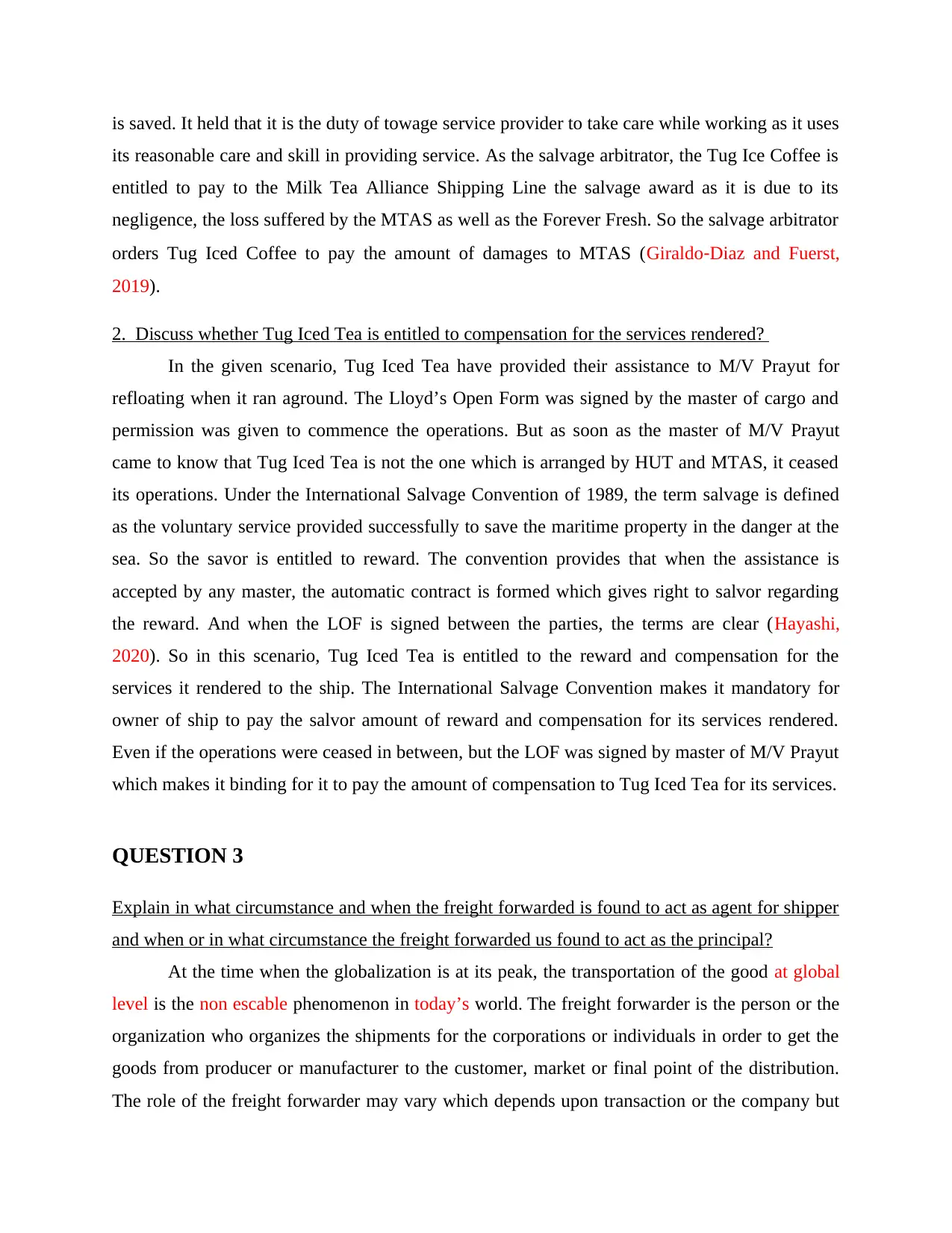
is saved. It held that it is the duty of towage service provider to take care while working as it uses
its reasonable care and skill in providing service. As the salvage arbitrator, the Tug Ice Coffee is
entitled to pay to the Milk Tea Alliance Shipping Line the salvage award as it is due to its
negligence, the loss suffered by the MTAS as well as the Forever Fresh. So the salvage arbitrator
orders Tug Iced Coffee to pay the amount of damages to MTAS (Giraldo‐Diaz and Fuerst,
2019).
2. Discuss whether Tug Iced Tea is entitled to compensation for the services rendered?
In the given scenario, Tug Iced Tea have provided their assistance to M/V Prayut for
refloating when it ran aground. The Lloyd’s Open Form was signed by the master of cargo and
permission was given to commence the operations. But as soon as the master of M/V Prayut
came to know that Tug Iced Tea is not the one which is arranged by HUT and MTAS, it ceased
its operations. Under the International Salvage Convention of 1989, the term salvage is defined
as the voluntary service provided successfully to save the maritime property in the danger at the
sea. So the savor is entitled to reward. The convention provides that when the assistance is
accepted by any master, the automatic contract is formed which gives right to salvor regarding
the reward. And when the LOF is signed between the parties, the terms are clear (Hayashi,
2020). So in this scenario, Tug Iced Tea is entitled to the reward and compensation for the
services it rendered to the ship. The International Salvage Convention makes it mandatory for
owner of ship to pay the salvor amount of reward and compensation for its services rendered.
Even if the operations were ceased in between, but the LOF was signed by master of M/V Prayut
which makes it binding for it to pay the amount of compensation to Tug Iced Tea for its services.
QUESTION 3
Explain in what circumstance and when the freight forwarded is found to act as agent for shipper
and when or in what circumstance the freight forwarded us found to act as the principal?
At the time when the globalization is at its peak, the transportation of the good at global
level is the non escable phenomenon in today’s world. The freight forwarder is the person or the
organization who organizes the shipments for the corporations or individuals in order to get the
goods from producer or manufacturer to the customer, market or final point of the distribution.
The role of the freight forwarder may vary which depends upon transaction or the company but
its reasonable care and skill in providing service. As the salvage arbitrator, the Tug Ice Coffee is
entitled to pay to the Milk Tea Alliance Shipping Line the salvage award as it is due to its
negligence, the loss suffered by the MTAS as well as the Forever Fresh. So the salvage arbitrator
orders Tug Iced Coffee to pay the amount of damages to MTAS (Giraldo‐Diaz and Fuerst,
2019).
2. Discuss whether Tug Iced Tea is entitled to compensation for the services rendered?
In the given scenario, Tug Iced Tea have provided their assistance to M/V Prayut for
refloating when it ran aground. The Lloyd’s Open Form was signed by the master of cargo and
permission was given to commence the operations. But as soon as the master of M/V Prayut
came to know that Tug Iced Tea is not the one which is arranged by HUT and MTAS, it ceased
its operations. Under the International Salvage Convention of 1989, the term salvage is defined
as the voluntary service provided successfully to save the maritime property in the danger at the
sea. So the savor is entitled to reward. The convention provides that when the assistance is
accepted by any master, the automatic contract is formed which gives right to salvor regarding
the reward. And when the LOF is signed between the parties, the terms are clear (Hayashi,
2020). So in this scenario, Tug Iced Tea is entitled to the reward and compensation for the
services it rendered to the ship. The International Salvage Convention makes it mandatory for
owner of ship to pay the salvor amount of reward and compensation for its services rendered.
Even if the operations were ceased in between, but the LOF was signed by master of M/V Prayut
which makes it binding for it to pay the amount of compensation to Tug Iced Tea for its services.
QUESTION 3
Explain in what circumstance and when the freight forwarded is found to act as agent for shipper
and when or in what circumstance the freight forwarded us found to act as the principal?
At the time when the globalization is at its peak, the transportation of the good at global
level is the non escable phenomenon in today’s world. The freight forwarder is the person or the
organization who organizes the shipments for the corporations or individuals in order to get the
goods from producer or manufacturer to the customer, market or final point of the distribution.
The role of the freight forwarder may vary which depends upon transaction or the company but
⊘ This is a preview!⊘
Do you want full access?
Subscribe today to unlock all pages.

Trusted by 1+ million students worldwide
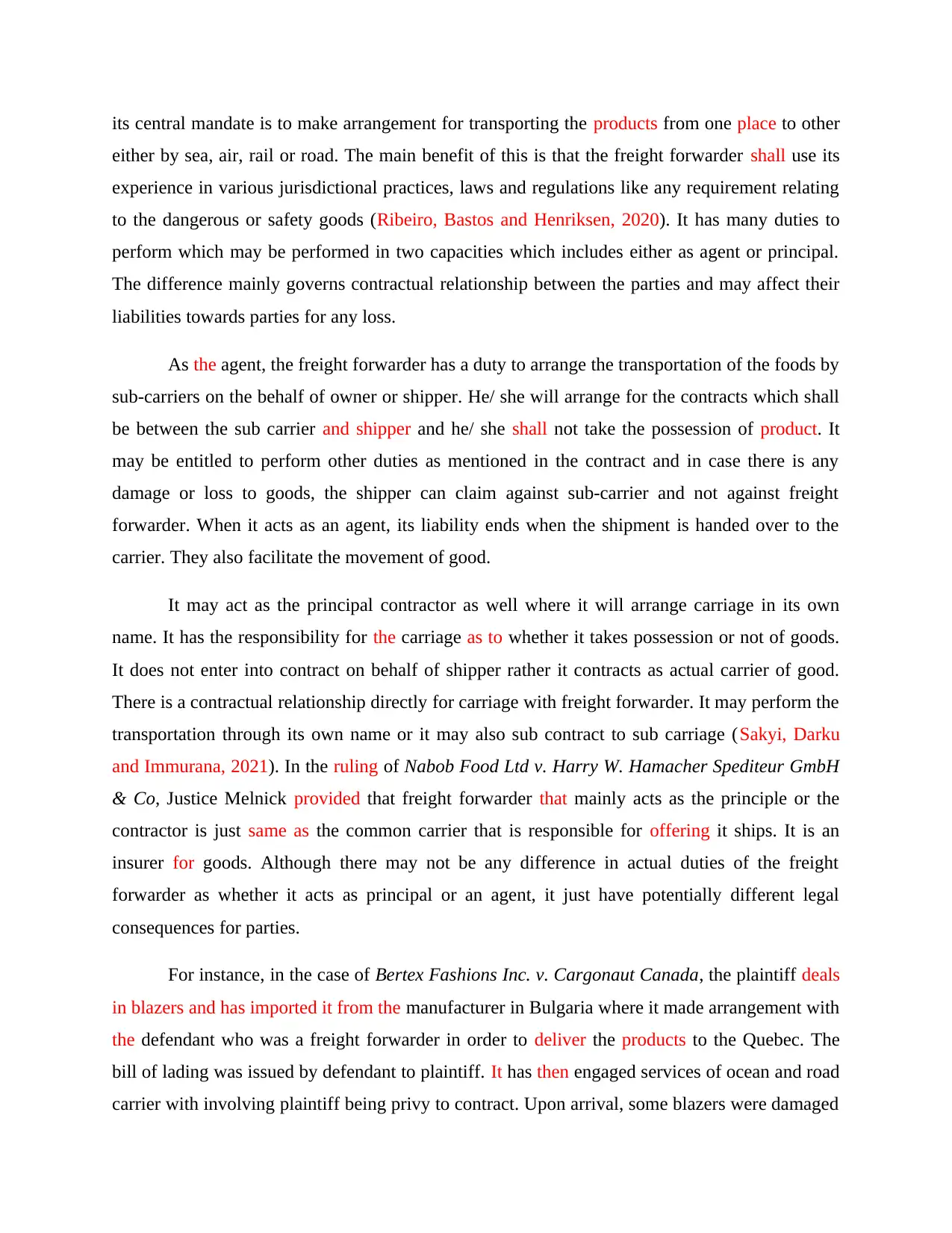
its central mandate is to make arrangement for transporting the products from one place to other
either by sea, air, rail or road. The main benefit of this is that the freight forwarder shall use its
experience in various jurisdictional practices, laws and regulations like any requirement relating
to the dangerous or safety goods (Ribeiro, Bastos and Henriksen, 2020). It has many duties to
perform which may be performed in two capacities which includes either as agent or principal.
The difference mainly governs contractual relationship between the parties and may affect their
liabilities towards parties for any loss.
As the agent, the freight forwarder has a duty to arrange the transportation of the foods by
sub-carriers on the behalf of owner or shipper. He/ she will arrange for the contracts which shall
be between the sub carrier and shipper and he/ she shall not take the possession of product. It
may be entitled to perform other duties as mentioned in the contract and in case there is any
damage or loss to goods, the shipper can claim against sub-carrier and not against freight
forwarder. When it acts as an agent, its liability ends when the shipment is handed over to the
carrier. They also facilitate the movement of good.
It may act as the principal contractor as well where it will arrange carriage in its own
name. It has the responsibility for the carriage as to whether it takes possession or not of goods.
It does not enter into contract on behalf of shipper rather it contracts as actual carrier of good.
There is a contractual relationship directly for carriage with freight forwarder. It may perform the
transportation through its own name or it may also sub contract to sub carriage (Sakyi, Darku
and Immurana, 2021). In the ruling of Nabob Food Ltd v. Harry W. Hamacher Spediteur GmbH
& Co, Justice Melnick provided that freight forwarder that mainly acts as the principle or the
contractor is just same as the common carrier that is responsible for offering it ships. It is an
insurer for goods. Although there may not be any difference in actual duties of the freight
forwarder as whether it acts as principal or an agent, it just have potentially different legal
consequences for parties.
For instance, in the case of Bertex Fashions Inc. v. Cargonaut Canada, the plaintiff deals
in blazers and has imported it from the manufacturer in Bulgaria where it made arrangement with
the defendant who was a freight forwarder in order to deliver the products to the Quebec. The
bill of lading was issued by defendant to plaintiff. It has then engaged services of ocean and road
carrier with involving plaintiff being privy to contract. Upon arrival, some blazers were damaged
either by sea, air, rail or road. The main benefit of this is that the freight forwarder shall use its
experience in various jurisdictional practices, laws and regulations like any requirement relating
to the dangerous or safety goods (Ribeiro, Bastos and Henriksen, 2020). It has many duties to
perform which may be performed in two capacities which includes either as agent or principal.
The difference mainly governs contractual relationship between the parties and may affect their
liabilities towards parties for any loss.
As the agent, the freight forwarder has a duty to arrange the transportation of the foods by
sub-carriers on the behalf of owner or shipper. He/ she will arrange for the contracts which shall
be between the sub carrier and shipper and he/ she shall not take the possession of product. It
may be entitled to perform other duties as mentioned in the contract and in case there is any
damage or loss to goods, the shipper can claim against sub-carrier and not against freight
forwarder. When it acts as an agent, its liability ends when the shipment is handed over to the
carrier. They also facilitate the movement of good.
It may act as the principal contractor as well where it will arrange carriage in its own
name. It has the responsibility for the carriage as to whether it takes possession or not of goods.
It does not enter into contract on behalf of shipper rather it contracts as actual carrier of good.
There is a contractual relationship directly for carriage with freight forwarder. It may perform the
transportation through its own name or it may also sub contract to sub carriage (Sakyi, Darku
and Immurana, 2021). In the ruling of Nabob Food Ltd v. Harry W. Hamacher Spediteur GmbH
& Co, Justice Melnick provided that freight forwarder that mainly acts as the principle or the
contractor is just same as the common carrier that is responsible for offering it ships. It is an
insurer for goods. Although there may not be any difference in actual duties of the freight
forwarder as whether it acts as principal or an agent, it just have potentially different legal
consequences for parties.
For instance, in the case of Bertex Fashions Inc. v. Cargonaut Canada, the plaintiff deals
in blazers and has imported it from the manufacturer in Bulgaria where it made arrangement with
the defendant who was a freight forwarder in order to deliver the products to the Quebec. The
bill of lading was issued by defendant to plaintiff. It has then engaged services of ocean and road
carrier with involving plaintiff being privy to contract. Upon arrival, some blazers were damaged
Paraphrase This Document
Need a fresh take? Get an instant paraphrase of this document with our AI Paraphraser
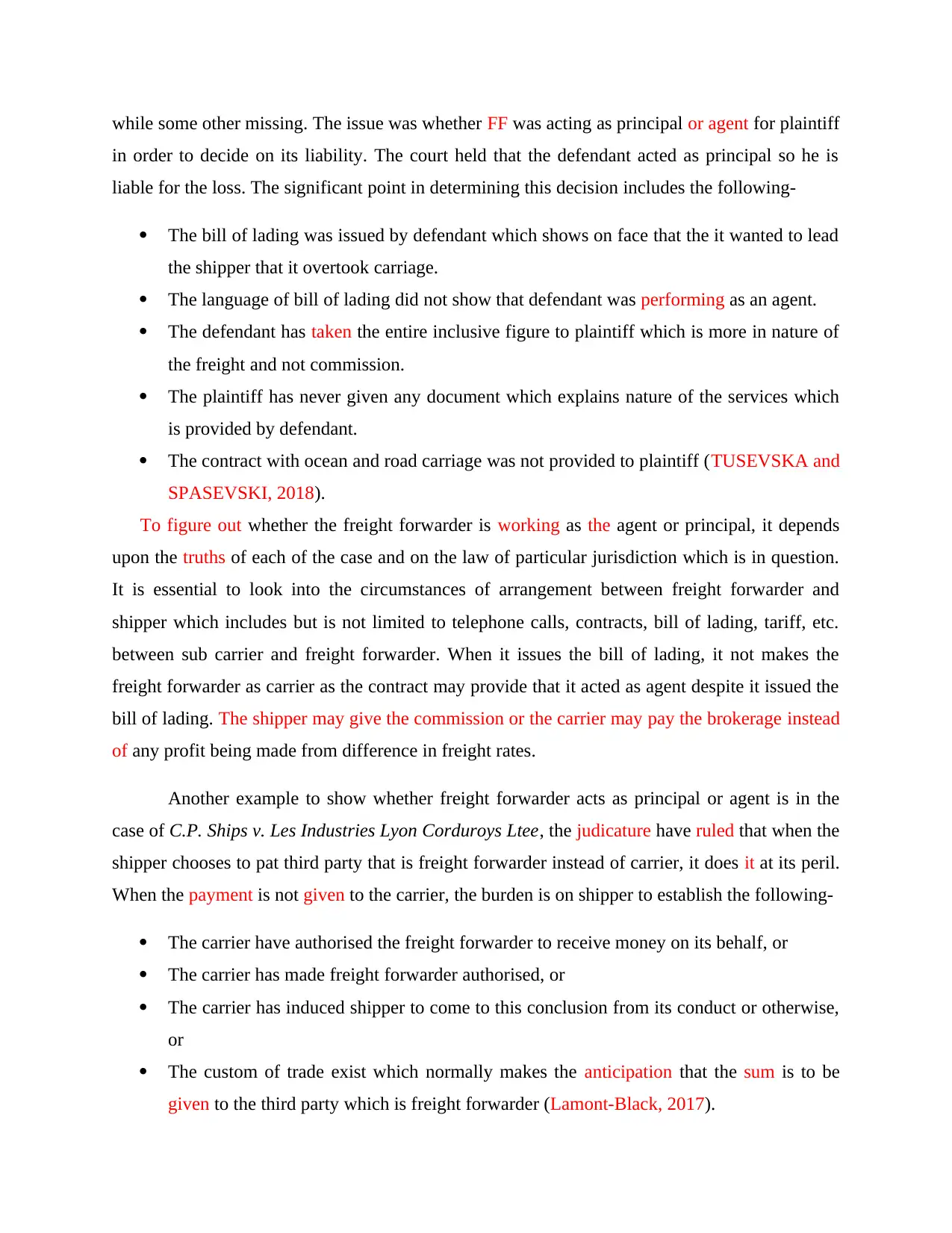
while some other missing. The issue was whether FF was acting as principal or agent for plaintiff
in order to decide on its liability. The court held that the defendant acted as principal so he is
liable for the loss. The significant point in determining this decision includes the following-
The bill of lading was issued by defendant which shows on face that the it wanted to lead
the shipper that it overtook carriage.
The language of bill of lading did not show that defendant was performing as an agent.
The defendant has taken the entire inclusive figure to plaintiff which is more in nature of
the freight and not commission.
The plaintiff has never given any document which explains nature of the services which
is provided by defendant.
The contract with ocean and road carriage was not provided to plaintiff (TUSEVSKA and
SPASEVSKI, 2018).
To figure out whether the freight forwarder is working as the agent or principal, it depends
upon the truths of each of the case and on the law of particular jurisdiction which is in question.
It is essential to look into the circumstances of arrangement between freight forwarder and
shipper which includes but is not limited to telephone calls, contracts, bill of lading, tariff, etc.
between sub carrier and freight forwarder. When it issues the bill of lading, it not makes the
freight forwarder as carrier as the contract may provide that it acted as agent despite it issued the
bill of lading. The shipper may give the commission or the carrier may pay the brokerage instead
of any profit being made from difference in freight rates.
Another example to show whether freight forwarder acts as principal or agent is in the
case of C.P. Ships v. Les Industries Lyon Corduroys Ltee, the judicature have ruled that when the
shipper chooses to pat third party that is freight forwarder instead of carrier, it does it at its peril.
When the payment is not given to the carrier, the burden is on shipper to establish the following-
The carrier have authorised the freight forwarder to receive money on its behalf, or
The carrier has made freight forwarder authorised, or
The carrier has induced shipper to come to this conclusion from its conduct or otherwise,
or
The custom of trade exist which normally makes the anticipation that the sum is to be
given to the third party which is freight forwarder (Lamont-Black, 2017).
in order to decide on its liability. The court held that the defendant acted as principal so he is
liable for the loss. The significant point in determining this decision includes the following-
The bill of lading was issued by defendant which shows on face that the it wanted to lead
the shipper that it overtook carriage.
The language of bill of lading did not show that defendant was performing as an agent.
The defendant has taken the entire inclusive figure to plaintiff which is more in nature of
the freight and not commission.
The plaintiff has never given any document which explains nature of the services which
is provided by defendant.
The contract with ocean and road carriage was not provided to plaintiff (TUSEVSKA and
SPASEVSKI, 2018).
To figure out whether the freight forwarder is working as the agent or principal, it depends
upon the truths of each of the case and on the law of particular jurisdiction which is in question.
It is essential to look into the circumstances of arrangement between freight forwarder and
shipper which includes but is not limited to telephone calls, contracts, bill of lading, tariff, etc.
between sub carrier and freight forwarder. When it issues the bill of lading, it not makes the
freight forwarder as carrier as the contract may provide that it acted as agent despite it issued the
bill of lading. The shipper may give the commission or the carrier may pay the brokerage instead
of any profit being made from difference in freight rates.
Another example to show whether freight forwarder acts as principal or agent is in the
case of C.P. Ships v. Les Industries Lyon Corduroys Ltee, the judicature have ruled that when the
shipper chooses to pat third party that is freight forwarder instead of carrier, it does it at its peril.
When the payment is not given to the carrier, the burden is on shipper to establish the following-
The carrier have authorised the freight forwarder to receive money on its behalf, or
The carrier has made freight forwarder authorised, or
The carrier has induced shipper to come to this conclusion from its conduct or otherwise,
or
The custom of trade exist which normally makes the anticipation that the sum is to be
given to the third party which is freight forwarder (Lamont-Black, 2017).
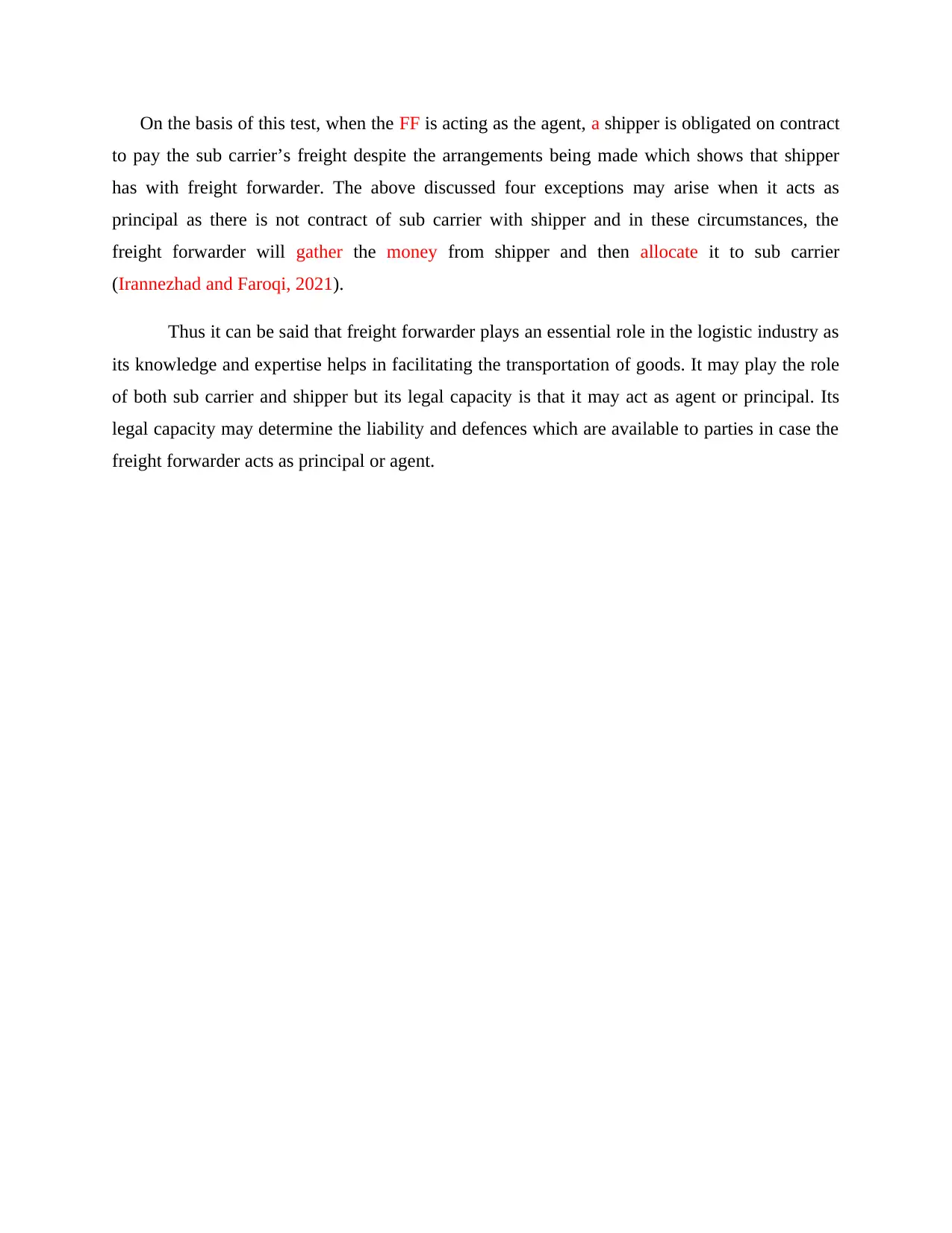
On the basis of this test, when the FF is acting as the agent, a shipper is obligated on contract
to pay the sub carrier’s freight despite the arrangements being made which shows that shipper
has with freight forwarder. The above discussed four exceptions may arise when it acts as
principal as there is not contract of sub carrier with shipper and in these circumstances, the
freight forwarder will gather the money from shipper and then allocate it to sub carrier
(Irannezhad and Faroqi, 2021).
Thus it can be said that freight forwarder plays an essential role in the logistic industry as
its knowledge and expertise helps in facilitating the transportation of goods. It may play the role
of both sub carrier and shipper but its legal capacity is that it may act as agent or principal. Its
legal capacity may determine the liability and defences which are available to parties in case the
freight forwarder acts as principal or agent.
to pay the sub carrier’s freight despite the arrangements being made which shows that shipper
has with freight forwarder. The above discussed four exceptions may arise when it acts as
principal as there is not contract of sub carrier with shipper and in these circumstances, the
freight forwarder will gather the money from shipper and then allocate it to sub carrier
(Irannezhad and Faroqi, 2021).
Thus it can be said that freight forwarder plays an essential role in the logistic industry as
its knowledge and expertise helps in facilitating the transportation of goods. It may play the role
of both sub carrier and shipper but its legal capacity is that it may act as agent or principal. Its
legal capacity may determine the liability and defences which are available to parties in case the
freight forwarder acts as principal or agent.
⊘ This is a preview!⊘
Do you want full access?
Subscribe today to unlock all pages.

Trusted by 1+ million students worldwide
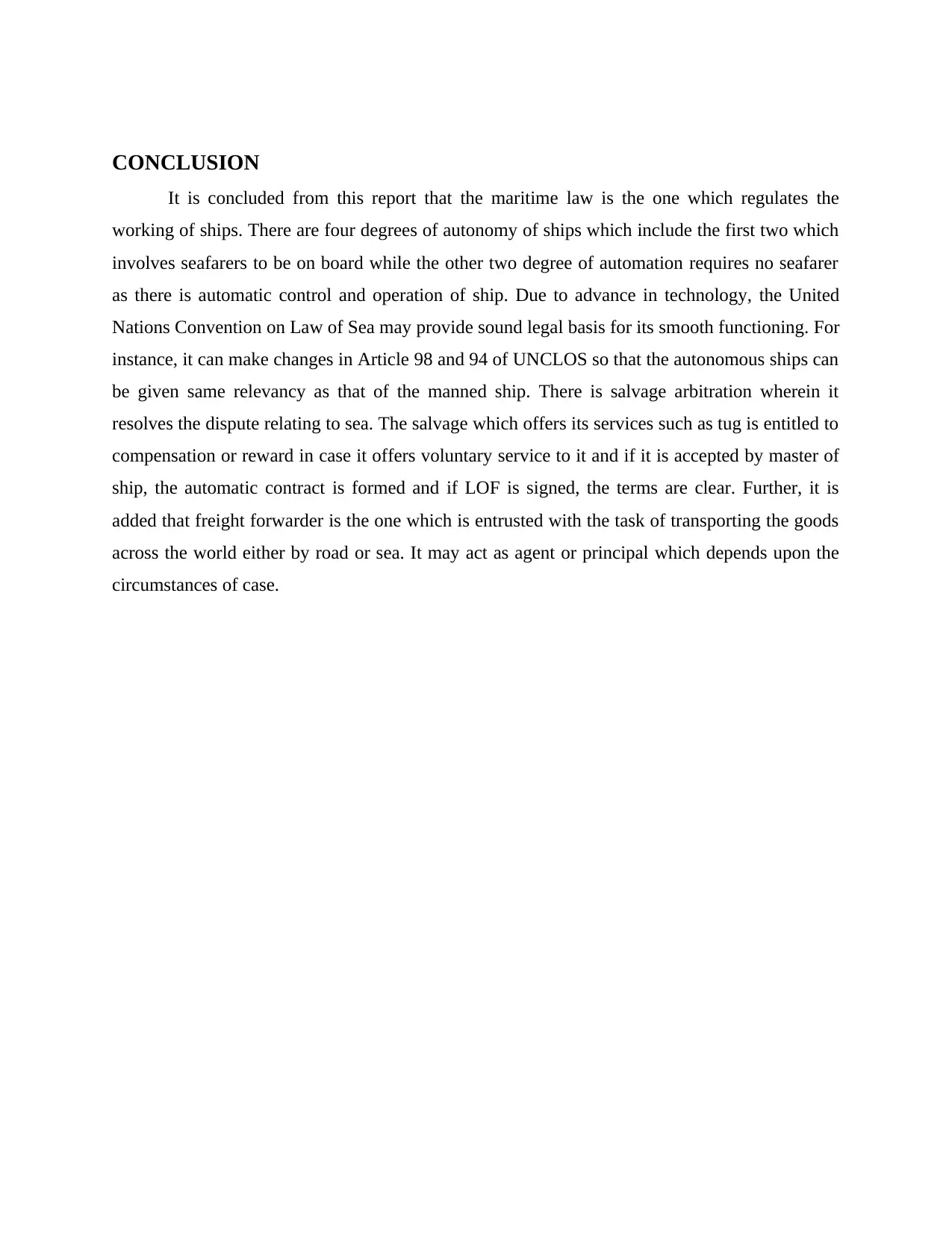
CONCLUSION
It is concluded from this report that the maritime law is the one which regulates the
working of ships. There are four degrees of autonomy of ships which include the first two which
involves seafarers to be on board while the other two degree of automation requires no seafarer
as there is automatic control and operation of ship. Due to advance in technology, the United
Nations Convention on Law of Sea may provide sound legal basis for its smooth functioning. For
instance, it can make changes in Article 98 and 94 of UNCLOS so that the autonomous ships can
be given same relevancy as that of the manned ship. There is salvage arbitration wherein it
resolves the dispute relating to sea. The salvage which offers its services such as tug is entitled to
compensation or reward in case it offers voluntary service to it and if it is accepted by master of
ship, the automatic contract is formed and if LOF is signed, the terms are clear. Further, it is
added that freight forwarder is the one which is entrusted with the task of transporting the goods
across the world either by road or sea. It may act as agent or principal which depends upon the
circumstances of case.
It is concluded from this report that the maritime law is the one which regulates the
working of ships. There are four degrees of autonomy of ships which include the first two which
involves seafarers to be on board while the other two degree of automation requires no seafarer
as there is automatic control and operation of ship. Due to advance in technology, the United
Nations Convention on Law of Sea may provide sound legal basis for its smooth functioning. For
instance, it can make changes in Article 98 and 94 of UNCLOS so that the autonomous ships can
be given same relevancy as that of the manned ship. There is salvage arbitration wherein it
resolves the dispute relating to sea. The salvage which offers its services such as tug is entitled to
compensation or reward in case it offers voluntary service to it and if it is accepted by master of
ship, the automatic contract is formed and if LOF is signed, the terms are clear. Further, it is
added that freight forwarder is the one which is entrusted with the task of transporting the goods
across the world either by road or sea. It may act as agent or principal which depends upon the
circumstances of case.
Paraphrase This Document
Need a fresh take? Get an instant paraphrase of this document with our AI Paraphraser
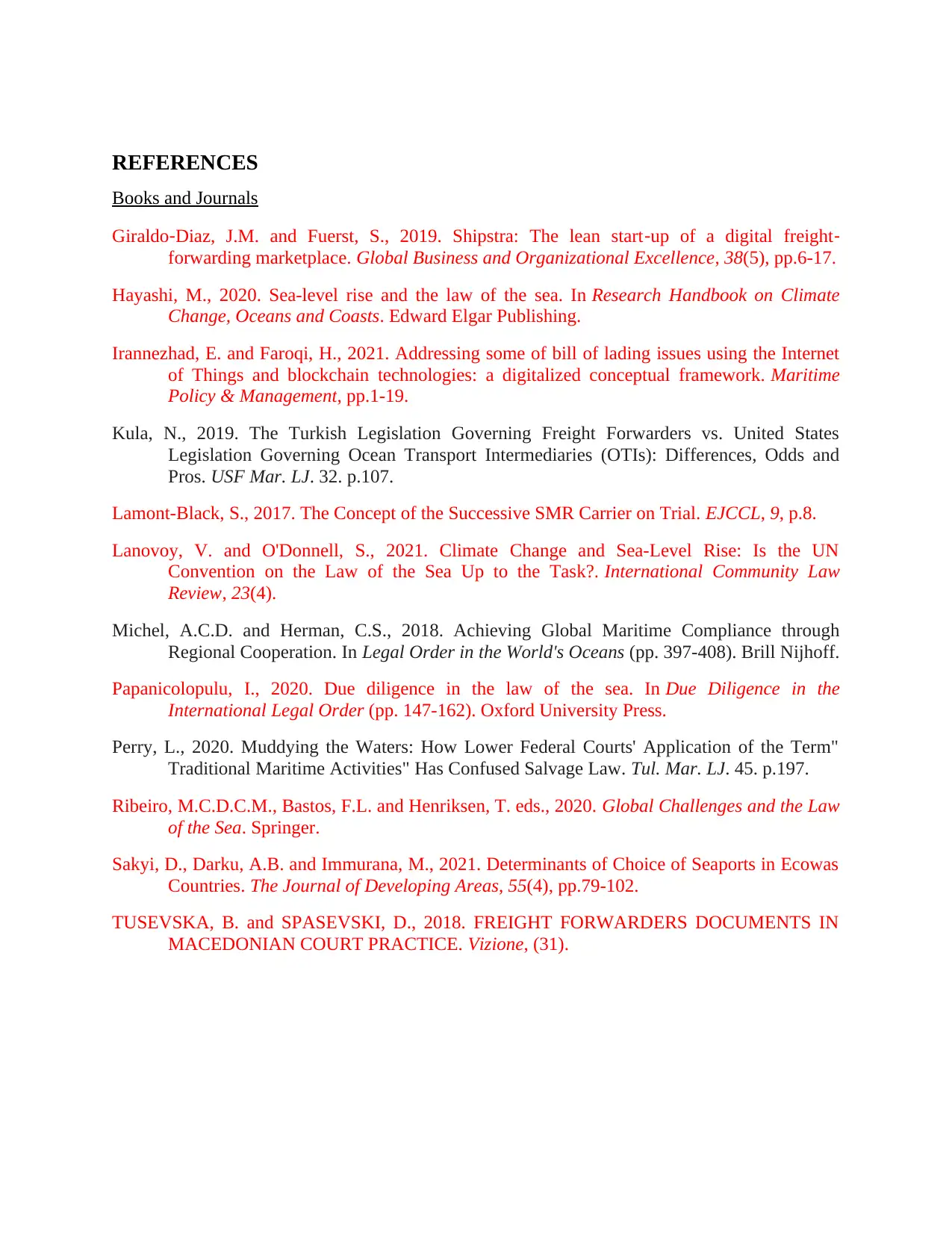
REFERENCES
Books and Journals
Giraldo‐Diaz, J.M. and Fuerst, S., 2019. Shipstra: The lean start‐up of a digital freight‐
forwarding marketplace. Global Business and Organizational Excellence, 38(5), pp.6-17.
Hayashi, M., 2020. Sea-level rise and the law of the sea. In Research Handbook on Climate
Change, Oceans and Coasts. Edward Elgar Publishing.
Irannezhad, E. and Faroqi, H., 2021. Addressing some of bill of lading issues using the Internet
of Things and blockchain technologies: a digitalized conceptual framework. Maritime
Policy & Management, pp.1-19.
Kula, N., 2019. The Turkish Legislation Governing Freight Forwarders vs. United States
Legislation Governing Ocean Transport Intermediaries (OTIs): Differences, Odds and
Pros. USF Mar. LJ. 32. p.107.
Lamont-Black, S., 2017. The Concept of the Successive SMR Carrier on Trial. EJCCL, 9, p.8.
Lanovoy, V. and O'Donnell, S., 2021. Climate Change and Sea-Level Rise: Is the UN
Convention on the Law of the Sea Up to the Task?. International Community Law
Review, 23(4).
Michel, A.C.D. and Herman, C.S., 2018. Achieving Global Maritime Compliance through
Regional Cooperation. In Legal Order in the World's Oceans (pp. 397-408). Brill Nijhoff.
Papanicolopulu, I., 2020. Due diligence in the law of the sea. In Due Diligence in the
International Legal Order (pp. 147-162). Oxford University Press.
Perry, L., 2020. Muddying the Waters: How Lower Federal Courts' Application of the Term"
Traditional Maritime Activities" Has Confused Salvage Law. Tul. Mar. LJ. 45. p.197.
Ribeiro, M.C.D.C.M., Bastos, F.L. and Henriksen, T. eds., 2020. Global Challenges and the Law
of the Sea. Springer.
Sakyi, D., Darku, A.B. and Immurana, M., 2021. Determinants of Choice of Seaports in Ecowas
Countries. The Journal of Developing Areas, 55(4), pp.79-102.
TUSEVSKA, B. and SPASEVSKI, D., 2018. FREIGHT FORWARDERS DOCUMENTS IN
MACEDONIAN COURT PRACTICE. Vizione, (31).
Books and Journals
Giraldo‐Diaz, J.M. and Fuerst, S., 2019. Shipstra: The lean start‐up of a digital freight‐
forwarding marketplace. Global Business and Organizational Excellence, 38(5), pp.6-17.
Hayashi, M., 2020. Sea-level rise and the law of the sea. In Research Handbook on Climate
Change, Oceans and Coasts. Edward Elgar Publishing.
Irannezhad, E. and Faroqi, H., 2021. Addressing some of bill of lading issues using the Internet
of Things and blockchain technologies: a digitalized conceptual framework. Maritime
Policy & Management, pp.1-19.
Kula, N., 2019. The Turkish Legislation Governing Freight Forwarders vs. United States
Legislation Governing Ocean Transport Intermediaries (OTIs): Differences, Odds and
Pros. USF Mar. LJ. 32. p.107.
Lamont-Black, S., 2017. The Concept of the Successive SMR Carrier on Trial. EJCCL, 9, p.8.
Lanovoy, V. and O'Donnell, S., 2021. Climate Change and Sea-Level Rise: Is the UN
Convention on the Law of the Sea Up to the Task?. International Community Law
Review, 23(4).
Michel, A.C.D. and Herman, C.S., 2018. Achieving Global Maritime Compliance through
Regional Cooperation. In Legal Order in the World's Oceans (pp. 397-408). Brill Nijhoff.
Papanicolopulu, I., 2020. Due diligence in the law of the sea. In Due Diligence in the
International Legal Order (pp. 147-162). Oxford University Press.
Perry, L., 2020. Muddying the Waters: How Lower Federal Courts' Application of the Term"
Traditional Maritime Activities" Has Confused Salvage Law. Tul. Mar. LJ. 45. p.197.
Ribeiro, M.C.D.C.M., Bastos, F.L. and Henriksen, T. eds., 2020. Global Challenges and the Law
of the Sea. Springer.
Sakyi, D., Darku, A.B. and Immurana, M., 2021. Determinants of Choice of Seaports in Ecowas
Countries. The Journal of Developing Areas, 55(4), pp.79-102.
TUSEVSKA, B. and SPASEVSKI, D., 2018. FREIGHT FORWARDERS DOCUMENTS IN
MACEDONIAN COURT PRACTICE. Vizione, (31).
1 out of 11
Your All-in-One AI-Powered Toolkit for Academic Success.
+13062052269
info@desklib.com
Available 24*7 on WhatsApp / Email
![[object Object]](/_next/static/media/star-bottom.7253800d.svg)
Unlock your academic potential
Copyright © 2020–2026 A2Z Services. All Rights Reserved. Developed and managed by ZUCOL.
